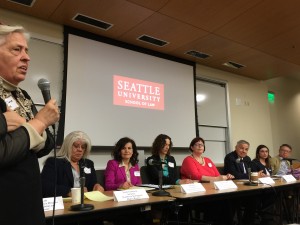
New America Media Executive Director Sandy Close moderating a Seattle-area ethnic media briefing on scams, with Federal Trade Commission officials and community advocates. PHOTOS BY ANTHONY ADVINCULA/NAM
SEATTLE, Washington — The call came in on his business phone last month. It was about 4:00 p.m., Kye Lee remembers, when the caller — a man who introduced himself as a Public Utility District (PUD) agent — was demanding that he pay $621.56 for unpaid electric bills.
“If I won’t be able to comply with the payment
Baffled, the 64-year-old Korean immigrant says he had to stop what he was working on at that moment in his grocery
“I have never been late paying my utility bills for seven years [since I have had my business],” Lee said through a translator
Recently, consumer scams primarily targeting
In Washington, scammers – from notarios (notary services) and lending companies to debt collectors and merchandise businesses
Seemingly legitimate
According
The FTC and other law enforcement agencies, Harwood says, received 2.6 million scam-related complaints. Most of these complaints, which did not include the ones in the Do Not Call registry
The Do Not Call registry
With the use of advanced technology, particularly the Internet
Harwood said: “We can’t continue
Encouraging people to speak out, especially those who have fallen victims, Harwood added that it is important to “let the consumer advocates and law enforcers” know how they can help when the problem occurs.
“We can’t just be quiet when we’re victims of scams because we won’t be able to know about it,” he said
As for Lee’s case, the fake PUD agent insisted that in order to continue
“I asked the caller, ‘Why this is such a short notice?’ And he told me that a previous notice was sent in the mail two days ago, but I failed to respond,” Lee said. “He even told me that I was lucky to have been given a day-long extension.”
Lee was then instructed to go to a nearby Albertson’s Supermarket and buy a prepaid card called Reloadit to pay his bills. After the purchase, he called the bogus PUD agent and gave the prepaid number on the back of the card.
Then, when he asked for a confirmation
“I felt helpless,” he said.
Jennifer Leach, acting assistant director for the FTC’s division of consumer and business education
“Even if the call is random, as a lot of them are, the victims say it feels like ‘they know me,’ because they have some information about them,” she said.
In denial?
The victims, Leach said, may be in denial when it happens to them. But she says that by speaking out to authorities, it would help a lot to expose the fraud.
“Scammers are professionals,” she added. “It’s their job to get your
Based on studies, according
“There’s something about it when you say it loud, and it doesn’t matter whom you talk to about it,” she added. “The scammers want to take your money as fast as they can. So if you make it longer for them, they may also move on.
Many undocumented immigrants victimized by scams, however, don’t report
“We don’t care about immigration status,” assured Leach. “We don’t track it; we don’t report it. We just don’t care about it.”
Scams, warned Shannon Smith, consumer protection division chief of Attorney General’s Office in Washington, “involve all aspects of economy – from mom-and-pop shops to very large corporations,” and so awareness from immigrant consumers is the key to avoid being a victim.
“There’s a wide range of people out there with deceptive businesses
Notarios publicos
In Yakima Valley, about two hours away from Seattle, notario publicos – which are mostly unlicensed immigration assistants – have been reportedly targeting
“I have seen thousands of farm workers who have been impacted by notarios,” said Laura Contreras, an immigration attorney for Northwest Immigrant Rights Project. “Many of these are actually trying to do good, but they do more harm in the end.”
After Pres. Obama announced his executive order
“Notarios are long-timers – and they even advertise,” she said. “Some of them may file an application
According
Lai cited a Vietnamese man who posed as a USCIS officer, falsely promising other Vietnamese immigrants that if they pay, the process
Restitution
But can victims get restitution for the money they have lost?
While the FTC does not handle individual cases, Harwood says that the agency has been able to get some of the money back for the victimized consumers, as part of a lawsuit against the scammers.
Last year alone, Harwood added that through the FTC’s law enforcement efforts, there were about 740,000 consumers who received more than $65 million in restitution.
Some of the victims, however, may not be able to get the full amount they lost and “it may take two to three years” for a lawsuit to be completed.
“Even if, say, they only get half of their money back, I believe that justice has been served for them,” Harwood said.
For Kye Lee, his experience with a scammer has made him more determined to help increase awareness in the immigrant communities.
“As a victim, I feel humiliated and frustrated. It’s really difficult to get fooled,” Lee said. “But I know better now, and I will do what I can so people would not experience what I had.”
To report consumer scams and fraudulent activities in Washington State, call the Federal Trade Commission at 1-877-FTC-HELP; or Washington’s Office of the Attorney General at 1-800-551-4636 or 206-464-6684.
This story is part of a series of ethnic media roundtable discussions on consumer scams across the United States, conducted by New America Media, in partnership with Federal Trade Commission and other law enforcement agencies.
Like us on Facebook